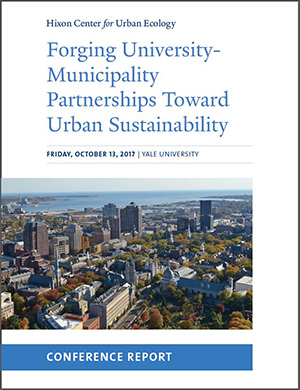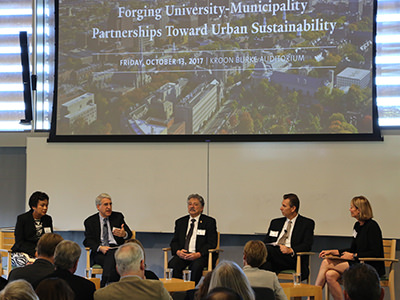 On October 13, 2017, over 100 participants gathered in Burke Auditorium for the annual Hixon Center for Urban Ecology conference. “Forging University-Municipality Partnerships Toward Urban Sustainability” explored ways in which universities and their host cities are working together on sustainability projects and programs. Organized by the Hixon Center and the Office of Sustainability, the conference brought together representatives from a dozen university-municipality partnerships from across the United States and Canada.
On October 13, 2017, over 100 participants gathered in Burke Auditorium for the annual Hixon Center for Urban Ecology conference. “Forging University-Municipality Partnerships Toward Urban Sustainability” explored ways in which universities and their host cities are working together on sustainability projects and programs. Organized by the Hixon Center and the Office of Sustainability, the conference brought together representatives from a dozen university-municipality partnerships from across the United States and Canada.
The conference was a town-gown partnership in itself, being co-hosted by the City of New Haven. President Peter Salovey and Mayor Toni Harp opened the day with remarks around their commitment to working together to address climate issues in New Haven, especially given the city’s coastal perch and the increasing threat of severe storms and rising sea levels. They both emphasized the importance of collaboration to be exemplars of best practices for the world.
A newly-released conference report showcases the town-gown partnerships presented at the conference through the lens of several key procedural themes and demonstrates lessons learned across the varied examples. It highlights the diversity of these partnerships and how universities and cities can collaborate to enhance urban sustainability. The common factors for successful partnerships identified include:
- Committed leadership at the university and city level;
- A partnership structure that fits the particular town-gown context, ranging from two people working together to formalized agreements between the entities;
- Ongoing stakeholder engagement across the broader community;
- Sustainable funding from sources such as federal and regional governments, foundations and private entities, and university endowments;
- Shared technical expertise and data; and,
- An equitable collaboration that establishes respect among partners.
 The topical panels, on transportation, stormwater management and resilience, and climate action, were designed around the Ambitions of the Yale Sustainability Plan 2025. The Plan sets goals to increase sustainable transportation, create a campus resilience plan in alignment with local and regional priorities, and achieve carbon neutrality by or before 2050, among other initiatives. The City of New Haven’s Climate & Sustainability Framework, released in January, contains similar goals to reduce greenhouse gas emissions and enhance resilience. The University and City can learn from the examples of town-gown partnerships presented at the conference to achieve these goals and build a more sustainable shared community.
The topical panels, on transportation, stormwater management and resilience, and climate action, were designed around the Ambitions of the Yale Sustainability Plan 2025. The Plan sets goals to increase sustainable transportation, create a campus resilience plan in alignment with local and regional priorities, and achieve carbon neutrality by or before 2050, among other initiatives. The City of New Haven’s Climate & Sustainability Framework, released in January, contains similar goals to reduce greenhouse gas emissions and enhance resilience. The University and City can learn from the examples of town-gown partnerships presented at the conference to achieve these goals and build a more sustainable shared community.
A video recording of the conference is available here.